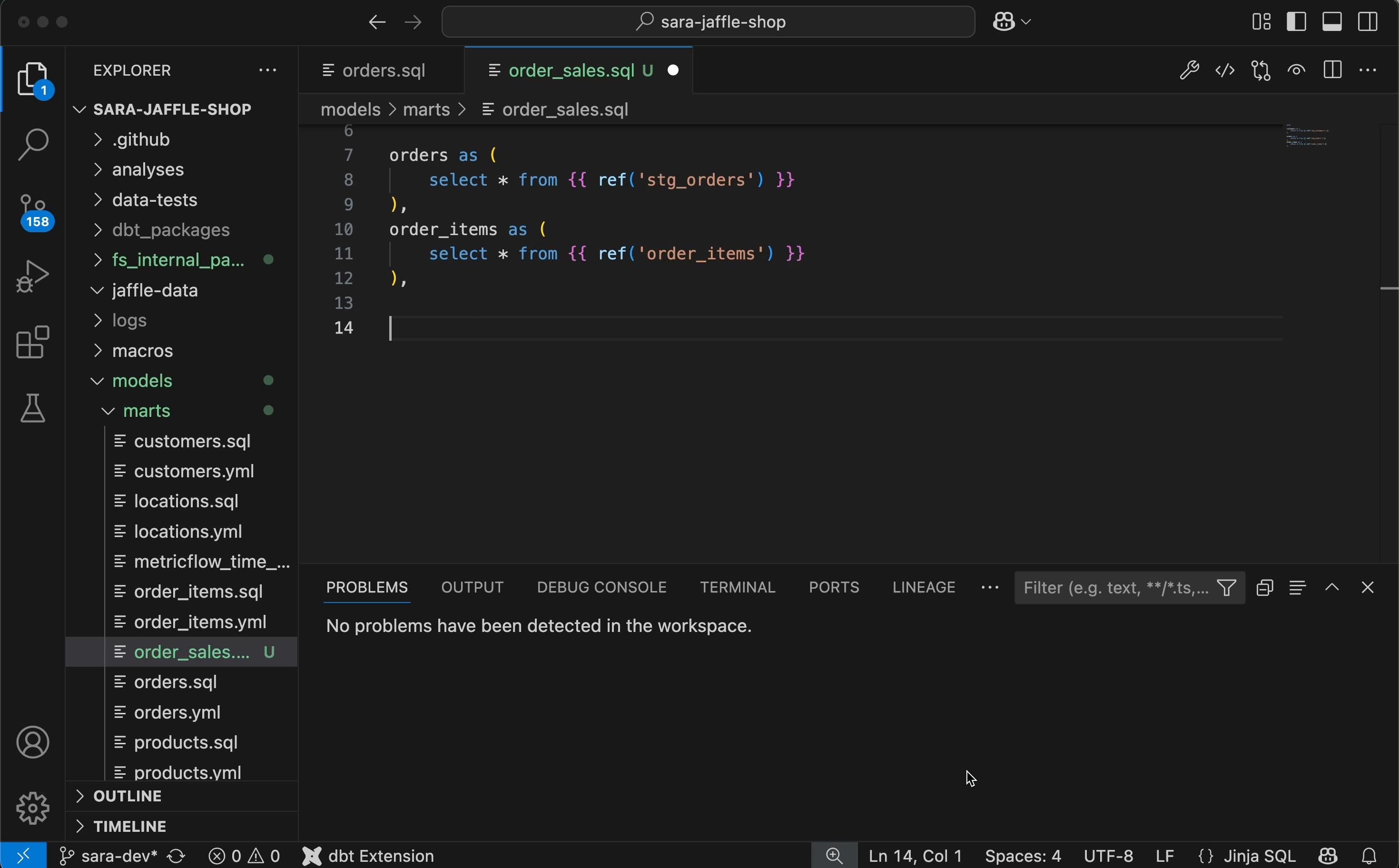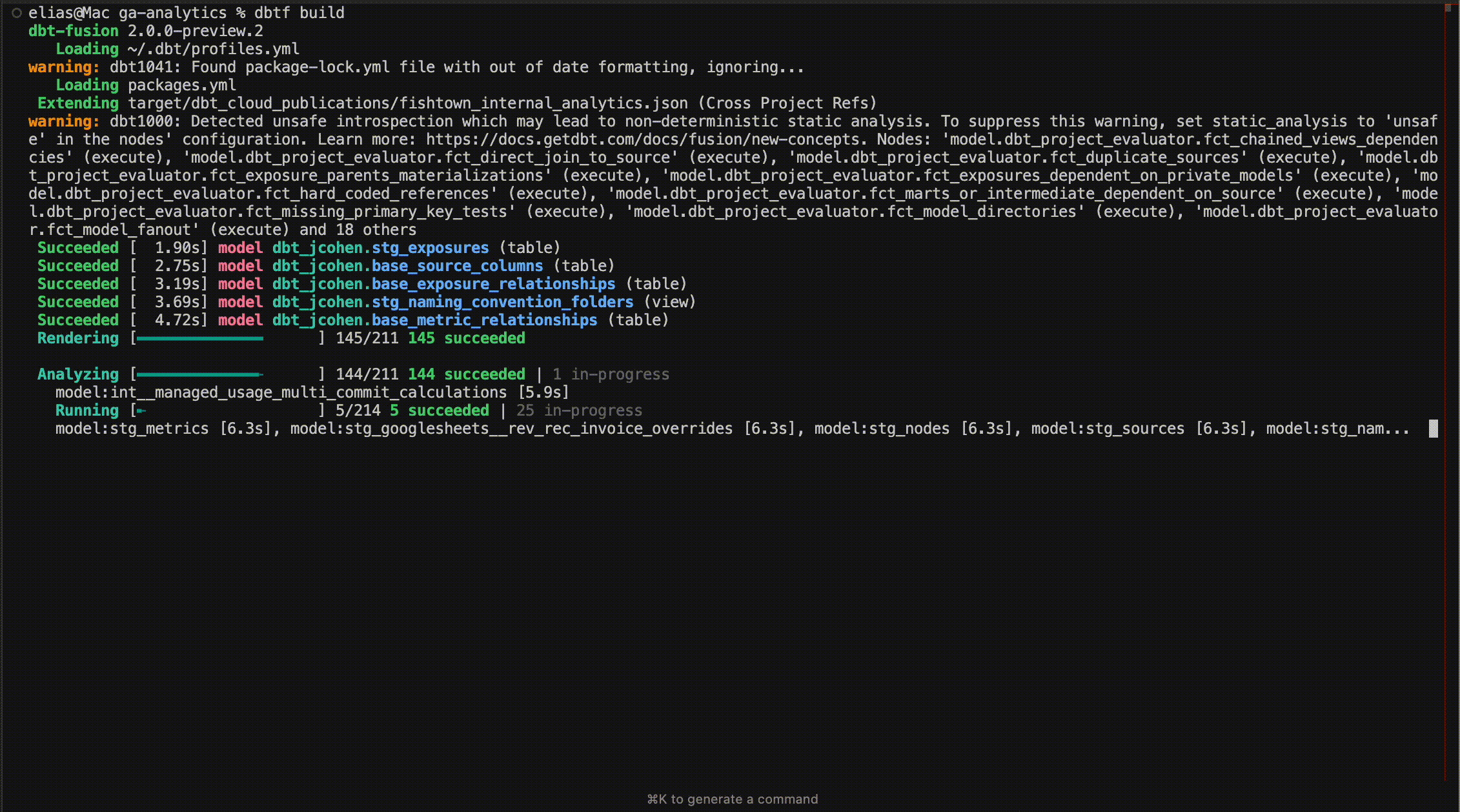Fusion and the dbt VS Code extension are now in Preview for local development
Big news—the dbt Fusion engine is now in Preview for local development on Snowflake, Databricks, BigQuery, and Redshift, available in both the dbt VS Code extension and the CLI.
Fusion marks a step-function improvement in what it means to build on dbt, with 30x faster parse times than dbt Core, local query validation straight from the command line, and a new compile cache to drastically speed up the developer loop (we heard you!).
And if you’re tapping into Fusion from the dbt VS Code extension (also in Preview today), you’ll enjoy sleek development features like rapid, in-line SQL validation, code autocompletion, automated refactoring, CTE preview, and more. Developing dbt code in Fusion is designed to be dramatically faster, more reliable, and more delightful than ever before.
Note that a Preview release of Fusion for the cloud-hosted dbt platform will follow soon (currently in beta).
So, what’s new in Preview?
Since the Fusion beta launch in late May, our teams have been shipping daily improvements to both the engine and the dbt VS Code extension. We’ve added support for the four primary adapters (Snowflake, Databricks, BigQuery, and Redshift), we’ve incorporated feedback from early adopters in an intense beta program, and have already seen hundreds of teams move to adopt Fusion.
A snapshot of the progress made since May:
- 450+ weekly average projects running on Fusion
- 5,500+ weekly average users of the dbt VS Code extension
- Launched support for the four most used adapters in the dbt ecosystem: Snowflake, Databricks, BigQuery, and Redshift
- 3-5 new features shipped every week (including exposures, the clone command,
--emptyand--sample, Cloud CLI credentials, onboarding improvements, and more) - Revamped logging to make it easier to debug and audit runs
- Added first class support for Windows operating systems, both for the Fusion binary and the dbt VS Code extension
- 700+ bugs addressed and stability improvements shipped
- Rolled out a new language server (LSP) cache to dramatically improve subsequent compile times in the VS Code extension. This is particularly relevant for large scale dbt projects with significant introspection query usage
- Published 8 editions of the Fusion Diaries, the weekly changelog on our path towards Fusion general availability
We know that replatforming an entire engine that serves a passionate community of 60,000+ teams is…both hard work and a process! The team has been putting in the very hard work to deliver the results in the stats above, and today’s Preview release is testament to that. As for the process, this release moves us one step closer on our path to GA, making Fusion compatible with more warehouses, projects, and dbt features than ever before.
We used to depend on `dbt build` to catch issues, and sometimes errors wouldn't surface until a pull request was created. Now, they're flagged instantly in VS Code, allowing us to spot subtle mistakes that might have gone unnoticed. Fusion has also been a major win for CI processes: developers can fix problems before opening a pull request, saving time and preventing broken builds."
Sonja Strempel Analytics Engineer @DPG Media
But we know we’re not done yet. While Fusion doesn’t support every existing dbt project or feature yet, each week we get incrementally better. In the meantime, auto-fix scripts make it easier to resolve deprecation warnings and to get prepared to run on Fusion.
If you use dbt Core and haven’t checked out Fusion since May, we’re confident that now is a great time to give the new engine a whirl. In the next sections we’ll walk through our approach to conformance with dbt Core and which projects are a great fit for Fusion today.
Current progress on conformance with dbt Core
As we ship improvements to Fusion, we've been measuring a metric we call “Fusion conformance.” Fusion conformance aims to prove Fusion will perform exactly the same as dbt Core for a given project. Conformance breaks down into several stages: first parse, then compile, then build (like dbt parse, dbt compile, and dbt build).
- Parse conformance measures the projects with valid dbt code that Fusion can successfully understand.
- Compile conformance measures whether Fusion can understand your dbt project, comprehend its underlying SQL, and is ready to run your models against the warehouse and power all the new features in the VS Code extension’s LSP.
- Build conformance tests everything, ensuring that Fusion runs, tests, seeds, compiles, and parses models in the same way dbt Core does.
Our data now shows that after running our auto-fix script, a sufficient percentage of user projects are passing compile conformance tests. Along with an active community of users using Fusion on their projects for development and in production, this metric gives us confidence to designate the engine as Preview today.
The best candidates for Fusion today
To gauge whether your project will easily run on Fusion, there are two key factors to keep in mind: project complexity and blocking features. We continue to tackle regular improvements to both.
- Model count is the best proxy for project complexity. Through testing, we’ve found that projects with fewer than 500 models typically perform well with Fusion. As project size grows, performance may vary, and projects with more than 3,000 models are likely to experience the most challenges today, particularly if they rely heavily on introspection queries.
- Blocking features are certain dbt capabilities not yet supported in Fusion. Projects that depend on any of these features will not be able to run in Fusion today. You can review the current list of blocking features here.
Even if Fusion isn't currently recommended for your project, you can still explore its capabilities with the Jaffle Shop sample project by following our Fusion Quickstart Guide.
A critical next step is investing even more into build conformance, so that when we roll Fusion out more broadly to our customer base of dbt platform users, we’ll be able to communicate proactively and precisely the projects and customers that we know will be Fusion-compatible.
This is a journey we’re thrilled to be on, and one that’s redefining the developer experience; let’s dive into all the features and capabilities that are shipping with Fusion and the dbt VS Code extension today 👇.
Build faster, locally with the dbt Fusion engine
Fusion is the next-generation engine powering the future of dbt. It’s designed for speed, intelligence, and developer delight. And now, you can bring all of that power to your local development environment.
When you develop with Fusion, you get:
- Lightning-fast performance: Fusion is built in Rust, a systems-level language known for speed and memory safety, and is optimized to parse even the largest dbt projects 30x faster than dbt Core. This allows developers to iterate rapidly, stay in flow longer, and ultimately, ship high-quality data products faster.
- Built-in SQL comprehension: With Fusion, dbt can emulate your cloud data warehouse locally and reason about your code with the intelligence of a modern compiler. It’s a major shift that enables powerful new capabilities that profoundly up-level the development experience. For the best possible local development experience with Fusion, including real-time error validation, consider using the dbt VS Code extension. See the next section for more information.
- Shift left for better data quality: Fusion lets you spot issues in your code as you’re writing it, and surface errors locally on your machine—without hitting your cloud data platform or impacting production pipelines. This includes rapid impact analysis that instantly detects whether your changes break any downstream processes as you make them.
We anticipate the dbt Fusion engine will mark a new chapter for our data team — one where speed and efficiency are baked into every part of the analytics lifecycle.”
Matt Karan Senior Data Engineer @Obie Insurance
Local development with Fusion helps you move fast, catch issues early, and stay fully in control, all while working with the tools and development environments you’re already most familiar with. This workflow may be a good fit for teams that prefer to run dbt on their own infrastructure, work in compliance-heavy environments, or simply want the performance and experience of Fusion without relying on commercial software.
Best-in-class developer experience with the dbt VS Code extension
We’re bringing the power of Fusion right to your favorite editor. The dbt VS Code extension is now in Preview, delivering a native dbt Fusion engine experience directly in VS Code, Cursor, or Windsurf. It’s the fastest, smartest, and most context-aware way to work with dbt locally, and the only way to unlock the full potential of Fusion in your development environment.
The extension supercharges the dbt development experience with features that let you:
- Autocomplete SQL functions, model names, columns, macros, and more.
- Instantly refactor across your project: Rename models or columns and see references update project-wide.
- Jump to the definition of any
ref, macro, model, or column with a single click. Particularly useful in large projects with many models and macros. - Preview column types and schema information on hover
- Preview a CTE’s output directly from inside your dbt model for faster validation and debugging.
- See lineage at the column or table level as you develop—no context switching or breaking flow.
- View detailed logs to make it easier to spot and troubleshoot issues and audit performance
- … and more!
The Fusion engine with VS Code Extension is how folks will want to develop with dbt moving forward. This is awesome. It’s the experience we’ve all been waiting for.”
Bruno Souza de Lima Lead Data Engineer @pHData
To use the extension, your project must run on the dbt Fusion engine. It is not compatible with dbt Core.
Get started with Fusion: the new standard for analytics development
Today’s release marks a major milestone in our path to GA as Fusion becomes the go-to foundation for development in dbt. And this is just the beginning. We're actively working on expanding Fusion support to more environments and platforms in the coming months.
Are you ready to start building with Fusion?
You can:
- Install Fusion locally via the CLI (now in Preview)
- Install the dbt VS Code extension (now in Preview)
- Explore the Fusion Quickstart project to try Fusion in a sandboxed environment
- Read the docs to learn more
We’re excited to bring the Fusion experience to our users everywhere, and we can’t wait to hear what you build next.
VS Code Extension
The free dbt VS Code extension is the best way to develop locally in dbt.










